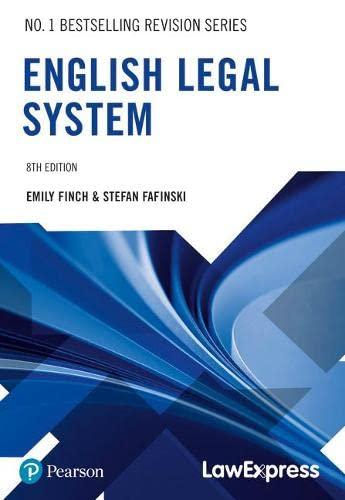Answered step by step
Verified Expert Solution
Question
1 Approved Answer
In response to a report of a possible burglary in progress, Officer Quinn arrived at Defendant Donald's house and began to investigate. Officer Quinn saw
In response to a report of a possible burglary in progress, Officer Quinn arrived at Defendant Donald's house and began to investigate. Officer Quinn saw movement through an open window and believed someone was inside. Soon after noticing this movement, Officer Quinn observed a male suspect back out of the front door of the house. Officer Quinn immediately identified himself and handcuffed the man, who told Officer Quinn that his girlfriend was still inside. At Officer Quinn's direction, the male suspect called the girlfriend out. The suspects claimed to have permission from Donald to be in the house, but they did not know how to contact Defendant Donald and did not have a key. Officer Quinn believed he had interrupted a burglary in progress, and entered the house to look for additional suspects and any evidence of a burglary. During this sweep, Officer Quinn noticed chemicals, glass vials, and laboratory equipment in a storage space above an open closet. He did not open the closet or move items to be able to see these items. He suspected that these items may have been used to manufacture drugs. After finishing his sweep, Officer Quinn called for his supervisor, Sergeant Pret, and described the chemicals, glass vials and laboratory equipment to him. Pret also was unable to tell whether the items were used in manufacturing drugs and called for assistance from the Drug Enforcement Bureau ("DEB"). During this time, Officer Quinn did not touch or move the items in the closet. Sergeant Pret did not enter the home. The DEB agents arrived about 45 minutes later, and entered the home. To get a better view of the items on the shelf, the DEB agents pulled over a stool that was in the room and one of them stood on it. Again, none of the items were touched. Based on their observations and experience, the DEB agents obtained a warrant to search Defendant Donald's house. During execution of the warrant, the officers seized drugs, drug paraphernalia, and chemicals used in drug production. Question 8 Answered Question 8 (16 points) Retake question Saved Did Officer Quinn require a warrant to enter and sweep Defendant Donald's home? Question 8 options: No, Officer Quinn had probable cause to enter the home. No, Officer Quinn had exigent circumstances so he did not need probable cause. No, Officer Quinn had exigent circumstances so he did not need a warrant. Yes, police officers always need a warrant to enter and sweep a private residence. Next incorrect question Question 11 Answered Question 11 (16 points) Retake question Saved Can Officer Quinn justify his view of what was later determined to be drug making supplies on the basis of the plain view doctrine? Question 11 options: Yes, because Officer Quinn was lawfully present, the officer had the lawful right to access the object, and the incriminating character was immediately apparent. No, because Officer Quinn was not lawfully present when he found the drug making supplies. Yes, because Officer Quinn was lawfully present, the officer had the lawful right to access the objection, and the DEB agents were able to immediately verify that the supplies were in fact utilized to make drugs. No, because the incriminating character of the supplies was not immediately apparent to Officer Quinn
Step by Step Solution
There are 3 Steps involved in it
Step: 1

Get Instant Access to Expert-Tailored Solutions
See step-by-step solutions with expert insights and AI powered tools for academic success
Step: 2

Step: 3

Ace Your Homework with AI
Get the answers you need in no time with our AI-driven, step-by-step assistance
Get Started


